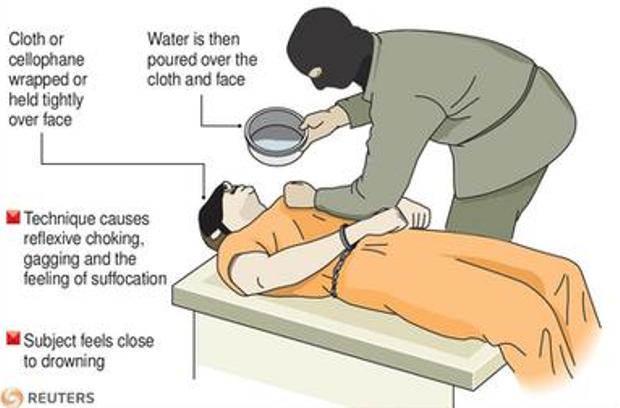The conflict is between individual safety and upholding American values.
Philadelphia Inquirer – May 6th, 2009
A “former senior CIA official” said in a recent interview that protecting American lives is the president’s most important job. If harsh interrogation techniques achieved that goal, he said, then they were justified. By abandoning these techniques, he added, President Obama is putting his “ideology” before the safety of our citizens.
But if protecting American lives had been the Founding Fathers’ primary concern, they would not have decided to take on the military might of the British empire. I would not go so far as to suggest that all the founders’ motives were pure, but at least some of them chose to put their “ideologies” before safety, risking their own lives and many others for their principles. Haven’t we done that repeatedly throughout our history?
If we are willing to do “whatever it takes” to extract information from our enemies, even when it stands in stark contrast to our political and social values, what exactly are we defending? The high school American-history class I teach has been debating these questions in the wake of the release of documents describing the CIA’s use of “enhanced interrogation techniques.”
The students recently read a secret memorandum known as “The Long Telegram,” written in 1946 by George Kennan, then a diplomat at the U.S. embassy in Moscow. At that time, many Americans were justified in believing that Soviet leaders hated capitalists and their political institutions, and were bent upon destroying them.
Though Kennan understood the reality of the threat much better than most, he was convinced that America was capable of dealing with it. He ended his list of detailed comments and recommendations on the subject with the following two sentences: “Finally, we must have courage and self-confidence to cling to our own methods and conceptions of human society. The greatest danger that can befall us in coping with this problem of Soviet communism is that we shall allow ourselves to become like those with whom we are coping.”
Four years later, in February 1950, Sen. Joseph McCarthy gave a speech, which the students also read. He charged that communist agents had infiltrated the U.S. State Department and famously brandished what he claimed was a list of their names. He went on to pursue these alleged spies with a total disregard for “our own methods and conceptions of human society.”
McCarthy destroyed the careers and reputations of a number of innocent Americans. There was no due process. They were treated as guilty simply because McCarthy pointed a finger at them. Finally – and it took years – a few brave souls began to stand up to the senator. Americans awoke to the realization that the country had lost its moral compass and allowed a demagogue to lead it.
Did McCarthy protect American lives? Was the witch hunt he conducted worth the collateral damage? One cannot say definitively. We will never know what would have happened if we had taken another course. What is clear is that McCarthy, his active supporters, and many who simply looked on became, as Kennan had warned, just “like those with whom we are coping.”
The end of the first decade of the 21st century might be a time for Americans to take a closer look at practices such as “extraordinary rendition” and “enhanced interrogation” and decide whether they should be ours.
Kennan said the Soviets had “always feared foreign penetration. They have learned to seek security only in patient but deadly struggle for total destruction of rival power.” The course Kennan proposed for Americans was different: “We must formulate and put forward for other nations a much more positive and constructive picture of the sort of world we would like to see than we have put forward in the past.”
I think this remains great advice. But, to my surprise, the students are almost evenly divided about the best way forward.
Some support Obama’s position on torture. For others, protecting American lives is the primary concern. Some believe our principles should come first. Others are afraid that post-9/11 realities require an entirely pragmatic approach to dealing with threats to our security. I did not expect to find myself – past 50 – on the side of the idealists.


Mr. Calder,
The issue of “torture” — and we’ll leave the true definition aside for the moment — is the single biggest example of hypocrisy in American political history. How? I will prove it right now:
Suppose your child was abducted and the police had in their custody someone whom the police know has knowledge of the person responsible but isn’t talking. You know that the first 3 hours in child abductions are critical in saving the child’s life; anytime greater than this three-hour window and the chances of recovering the child safely are extremely low.
If you knew waterboarding would provide the information needed to find and save your child, are you telling everyone who read your opinion piece today that you would uphold your “idealism” and let your child die at the hands of a sexual predator?
If your answer is “no” and you would approve waterboarding (if the police told you they had no time to employ a different technique and time was of the essence) than you are a hypocrite who only wants to save his own child and ignores the fact that waterboarding saved other people’s children and loved ones !
If you were intellectually honest and answered “yes” and didn’t allow the policy to harshly interrogate the suspect, allowing the critical window of time needed to save your child’s life to close, than you need your head examined!
Maybe folks like you who are so upset that we waterboarded Khalid Sheik Mohammad need to explain to your own children that their lives would be worth losing in a terrorist attack as long as we kept our “ideals” intact and treated terrorism suspects no more severely as your garden variety corner drug dealer. I’d like to see the looks on their faces as you basically explain to them that Daddy would do everything, but waterboarding, to save their lives.
Unfortunately, people like you are running the show now. God help us.
Mr. Calder
There is a segment of our population, and probably every population, I will call “The Protectors”. They truly believe they do good by protecting society but they are easily identified by their message of hate. They are usually a minority but in threatening times can take over the state. The extermination of the Native Americans, the Ku Klux Klan, and Manzanar are some examples of their work.
Perhaps the best approach is the educating our youth in the problems our Founding Fathers faced in controlling the Protectors and how they resolved them, as in the Fifth Amendment which banned confessions obtained by torture and by insisting that war can only be declared by the representatives of the entire American people. And how we failed as a people, using Jim Crow, Manzanar, and undeclared wars in Viet Nam and Iraq as examples.
My sons attended Germantown Friends and now my grandson is there. The Friends schools and the Society have been a voice of sanity in our world. Thank you,Steve Ward
Mr Calder,
Wouldnt “becoming like those with whom we are coping” in the case of islamic extremists be for the USA to start performing public beheadings and carrying out suicide bombings on civilian populations rather than employing enhanced interrogation tecniques? Dont we entrust the CIA to behave in accordance with human decency and American values already, as we have while they helped defeat Nazism and other evils? I remember seeing everyday innocents in business suits jumping out of a tower to thier deaths by the dozen; the idea of simulated drowning and sleep deprivation somehow doesnt sound like torture in context.
-Jeff
Jeff,
You’re right, “being like those with whom we are coping” in the case of Islamic extremists would retain public beheadings and suicide bombings. But what was said was becoming not being. What we have done with simulated drowning and sleep deprivation isn’t exactly what we are trying to cope with but it is the beginning, do you really want to turn out like that?
– Nico
Mr. Calder: Just a brief note to say I thought your article “Deciding what we won’t do” was very good. I copied out your quote from Kennan’s long telegram to add to my collection of quotes I want to remember. I have been around for more than 10 decades and, like you, are on the side of the “idealists.” I am somewhat dispirited, however, by your observation that your students at Friends Central are almost evenly divided about the best way to go forward. Perhaps I’d remind folks that “true patriotism hates injustice in its own land more than anywhere else.” (Clarence Darrow) or “He loves his country best who strives to make it best.” (Robert Ingersoll.)
by Nat Hentoff
Nat Hentoff is a member of the Reporters Committee for Freedom of the Press, and the Cato Institute, where he is a senior fellow.
The following is a portion of an article entitled “President Reagan’s Torture Advice to President Obama” that appeared in the Metro West Daily News on May 20, 2009.
“I would also like to bring into this conversation about restoring our reputation not only in the world but, most importantly, among future generations of Americans – a history teacher and college counselor at Friends’ Central School in Wynnewood, a suburb of Philadelphia. What Grant Calder tells his students is important for all of us who care about American history, past, present and future.
Fortunately, Calder teaches in a school where American history is still being taught – instead of the time-devouring teaching for tests to meet the pressures of local, state and federal mandates. In ‘Deciding what we won’t do’ (philly.com/inquirer/opinion), he tells of reminding his students of times of fear in our history when many Americans – including local, state and federal legislators – strongly believed they ‘were justified in believing that Soviet leaders hated capitalists and their institutions – and were bent on destroying them.’
The ‘Red Scare’ here began in the 1920s and crested with the signing of the Hitler-Soviet pact in 1939. As Calder told his class, George Kennan – an important figure in American diplomatic history – was serving as chief of mission at the U.S. Embassy in Moscow when he wrote in 1946 what was, for a time, a secret memorandum, ‘The Long Telegram.’ Sent to Secretary of State George Marshall, it was signed ‘X.’
Kennan was clearly under no illusions as to the dangers of that cruel and often inhuman dictatorship, but, as Calder emphasized to his students, Kennan urged: ‘We must have courage and self-confidence to cling to our own methods and conceptions of human society. After all, the greatest danger that can befall us in coping with this problem of Soviet communism, is that we shall allow ourselves to become like those with whom we are coping.’
While unquestionably desiring to keep us safe, the Bush-Cheney team did not remember that lesson, if they ever knew it. If there is not an honest, thorough investigation of their torture policy, future American administrations will also not have learned – and acted on – Reagan’s and Kennan’s wisdom. On Sept. 12, 2001, President George W. Bush pledged: ‘We will not allow this enemy to win the war by changing our way of life or restricting our freedoms.’ He later repeatedly assured the world, ‘We do not torture.’ Those pledges were badly broken, to our discredit throughout the world.”